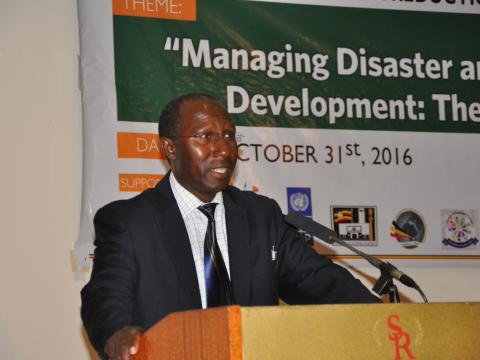Ugandan farmers suffering as devastating floods, drought hit

Ugandan farmers suffering as devastating floods, drought hit
MPs oriented on climate change
RACHEAL NINSIIMA
For 10 days, I travelled across the parched, drought-hit Kaabong district. The scorching heat, withered vegetation and dust-filled gusts of wind hint on the district’s former green glory. With no shower of rain in the past two months, rivers have dried up and pastoralists now move longer distances than usual. One Kaunda, a resident of the district points towards a river that has been reduced to a sand deposit. As we make our way through the river, sights of animals struggling to suck up water trapped in small wells is unmistakable.
Kaunda, a shepherd, is one of the hundreds of Karamoja region residents struggling after a strong El-Nino led to reduced rainfall in the region.
“I have had to travel about five kilometers further than what I usually travel in search of water for my animals. Farmers are reaping losses after sorghum and maize fields are dying up rapidly,” he tells me.
The escalating change in Uganda’s climate as witnessed by prolonged droughts and irregular rainfall patterns is undoubtedly demanding attention.With current average temperatures expected to increase up to 1.5°C by 2020, the frequency and severity of these hazards will increase. Moreover, climate change has the potential to halt or reverse the country’s development trajectory which is 80 per cent dependent on agriculture. This is because it is likely to increase food insecurity because of shifts in the productivity of agricultural and natural resources. The situation is worsened by the poor adaptation mechanisms of the population to the effects of climate change.
MPs ORIENTED IN CLIMATE CHANGE
It’s upon this background that an orientation meeting for members of parliament (MPs) was organized. The one-day orientation session was organised by the Uganda Parliamentary Forums on Climate Change (PFCC-U), Disaster Risk Reduction (DRR), and Sustainable Development Goals (SDGs), in partnership with the Office of the Prime Minister, UNDP, and the Africa Climate Change Resilience Alliance (a consortium made of CARE, OXFAM, World Vision and Save the Children).
The session was organised with the objective of increasing MPs understanding of the linkages between disaster risk reduction, climate change and sustainable development, as well as the critical role legislators’ play in realizing risk-informed development.
“One in 19 people developing countries are adversely affected by climate change effects compared to one in 1500 and this is attributed to ill preparedness. It’s not only equipment that we need as a country to address this issue but also a legal framework,” said Paul Isabirye in his keynote address. He is an expert from the Uganda National Meteorological Authority (UNMA).
Gilbert Kamanga, the national director of World Vision Uganda, urged members to consider incentivising alternative energy sources, thereby reducing the demand for charcoal and less environmental impacts.
Also addressing the session, the UN Resident Coordinator in Uganda, Ms. Rosa Malango, called on MPs to prioritize putting in place legislation to re-enforce Uganda’s world-leading National Policy on Disaster Preparedness and Management.
MPs SAY
Hon. Jennifer Namuyangu, the Kibuku woman MP, called on members to take on the issues of climate change and disaster risk head on, so to build public awareness and support for risk reduction and management measures. Hon. Esther Davinia Anyakun, the MP for Nakapiripirit, highlighted the need for better planning to anticipate and respond to increasing levels of disaster risk.
BUDDING SOLUTIONS
Hon Musa Ecweru, the Minister of State for Relief and Disaster Preparedness told attendants that government had developed hazard maps for all districts to raise awareness and empower leaders to make risk-informed decisions across all areas of local development.
“The Office of Prime Minister wants to strengthen district disaster committees to interpret phenomenons and channel data to relevant authorities,” Ecweru said.

